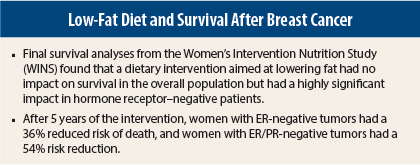Triple Negative Low Fat Diet
Low-Fat Diet Reduces Mortality in Breast Cancer Subset


Rowan T. Chlebowski, MD, PhD

C. Kent Osborne, MD

Low-Fat Diet and Survival After Breast Cancer
Exploratory analyses suggest a favorable lifestyle influence on survival in hormone receptor–negative subgroups.—Rowan T. Chlebowski, MD, PhD
The final survival analysis of the landmark Women's Intervention Nutrition Study (WINS) confirmed that a low-fat diet can reduce the risk of dying for a subset of breast cancer patients.1
At the San Antonio Breast Cancer Symposium, Rowan T. Chlebowski, MD, PhD, of the Los Angeles Biomedical Research Institute at the Harbor-UCLA Medical Center, reported that, after more than 15 years of follow-up, the dietary intervention for early-stage breast cancer patients was effective at improving survival among women with hormone receptor–negative tumors.
In women with estrogen receptor (ER)-negative tumors, a 36% statistically significant reduction in deaths was seen with intervention. The benefit was even greater—a 54% reduction in deaths—among women whose tumors were negative for both estrogen receptor and progesterone receptor (PR), Dr. Chlebowski reported.
"Exploratory analyses suggest a favorable lifestyle influence on survival in hormone receptor–negative subgroups," he said.
Dr. Chlebowski suggested that one's "take" on the data might differ, depending on whether it's viewed scientifically or clinically. "From a scientific standpoint, others will have to look at this exploratory analysis and decide if the data support a randomized clinical trial to confirm them. On an operational basis, however, there are multiple health benefits associated with a 5%, or 5-pound, weight loss, and this is a separate issue that women should consider," he suggested.
C. Kent Osborne, MD, Director of the Dan L. Duncan Cancer Center at Baylor College of Medicine in Houston, who moderated a press briefing where the results were presented, was impressed. "These results are pretty remarkable," he suggested. "We have well-outfitted infusion centers, but I'd bet that few oncologists take dietary intervention as seriously as we take our other treatments. The reduction in deaths for ER/PR-negative patients is as good as, or greater than, what we see with our best treatments."
WINS Initiated in 1994
The randomized phase III WINS trial was initiated in 1994 to evaluate whether dietary fat reduction could influence relapse-free survival in early-stage breast cancer patients receiving standard-of-care treatment. At enrollment, the 2,437 women were required to have a dietary fat intake > 20% of calories and were randomly assigned to a dietary intervention group or a control group.
The intervention aimed to reduce fat intake for 5 years while maintaining nutritional adequacy. Women were given a fat-gram goal by centrally trained, registered dietitians implementing a low-fat eating plan. The women underwent eight biweekly individual counseling sessions, were subsequently contacted every 3 months, and self-monitored their fat-gram intake using a "keeping score" book. Fat intake was externally monitored by unannounced 24-hour telephone recalls performed annually.
After 5 years of intervention, calories from fat were lowered by 9.2% and body weight was nearly 6 pounds less in the intervention group, compared to controls, Dr. Chlebowski reported.
"If you adhere to a low-fat diet, it's pretty easy to lose weight," he noted. "In the intervening 20 years, it's become clear that weight loss is probably more important than dietary fat in influencing breast cancer outcome."
Survival Data
In previous reports, after 5 years of follow-up, relapses were 24% lower in the intervention group. (P = .03). After 9 years of follow-up, there was no impact on overall survival in the whole population, but deaths in the ER/PR-negative subgroups were reduced by 64% (P = .003).
In the final survival analysis, with follow-up through 2013 (19.4 years maximum), there was still no overall survival benefit in the whole population—mortality rates were 17.0% in the intervention arms and 13.6% in the control arm (hazard ratio [HR] = 0.94, P = NS)—however, there was a fairly striking impact on survival in the ER-negative and ER/PR-negative groups, Dr. Chlebowski indicated.
In this exploratory analysis, median survival in the control arm was 11.7 years but was increased in the intervention group to 13.6 years among 478 ER-negative patients (HR = 0.64, P = .045) and to 14.0 years in the 362 women whose tumors were ER/PR-negative (HR = 0.46, P = .006).
"In the dietary intervention arm, median survival was almost 2 years greater," Dr. Chlebowski noted. For the ER/PR-negative patients, in the first 10 years poststudy, there were 69% fewer deaths in that group, after which the survival impact diminished somewhat, he indicated.
While HER2 status was not available at the time the study was conducted, recently published data by the Surveillance, Epidemiology, and End Results (SEER) program indicate that 73% of these ER/PR-negative women would have triple-negative tumors, he said. "This suggests there's a 54% improvement in survival, and a 2.3-year increase in median survival for triple-negative breast cancer patients," he emphasized. ■
Disclosure: Drs. Chlebowski and Osborne reported no potential conflicts of interest.
Reference
1. Chlebowski RT, Blackburn GL, for the Women's Intervention Nutrition Study Investigators: Final survival analyses from the Women's Intervention Nutrition Study (WINS) evaluating dietary fat reduction as adjuvant breast cancer therapy. San Antonio Breast Cancer Symposium. Abstract S5-08. Presented December 12, 2014.
Related Articles
Expert Point of View: Amy H. Comander, MD
Amy H. Comander, MD, a medical oncologist at the Massachusetts General Hospital Cancer Center and Instructor in Medicine at Harvard Medical School, Boston, told The ASCO Post that the findings will clearly help her in counseling patients. "I am excited to be able to discuss the study with my...
Source: https://ascopost.com/issues/january-25-2015/low-fat-diet-reduces-mortality-in-breast-cancer-subset/